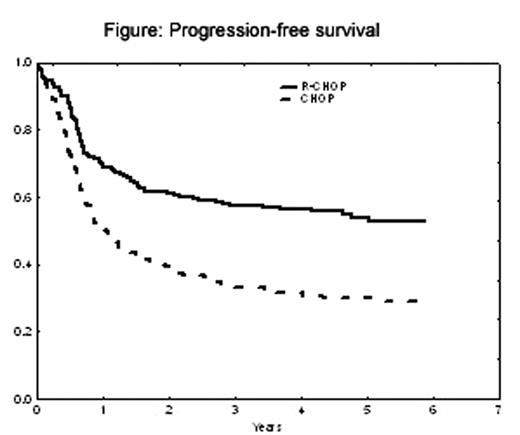Abstract
In 1998, the GELA (Groupe d’Etude des Lymphomes de l’Adulte) ran a randomized study to evaluate the benefit of the addition of rituximab to CHOP chemotherapy in elderly patients (60 to 80 years old) with diffuse large B-cell lymphoma. Early results were presented at ASH 2000 and published in
Table 1. 5-year survivals
| . | R-CHOP . | CHOP . | P value . |
|---|---|---|---|
| Median event-free survival | 3.8 y | 1.1 y | =0.00002 |
| 5-year event-free survival | 47% | 29% | |
| Median progression-free survival | Not reached | 1 y | <0.00001 |
| 5-year progression-free survival | 54% | 30% | |
| Median overall survival | Not reached | 3.1 y | =0.0073 |
| 5-year overall survival | 58% | 45% |
| . | R-CHOP . | CHOP . | P value . |
|---|---|---|---|
| Median event-free survival | 3.8 y | 1.1 y | =0.00002 |
| 5-year event-free survival | 47% | 29% | |
| Median progression-free survival | Not reached | 1 y | <0.00001 |
| 5-year progression-free survival | 54% | 30% | |
| Median overall survival | Not reached | 3.1 y | =0.0073 |
| 5-year overall survival | 58% | 45% |
Progression-free survival is shown in the figure; PFS does not included 19 patients who died in CR from causes not related to lymphoma or its treatment, 5 in CHOP arm and 14 in R-CHOP arm. It better reflects the long term effect of treatment on the disease. No severe late toxicity was observed in R-CHOP treated patients and deaths not related to lymphoma did not show any pattern.
In conclusion, long term results continue to show a major benefit for the addition of rituximab to CHOP in the treatment of patients with DLBCL. This improvement increases with time.
Author notes
Corresponding author


This feature is available to Subscribers Only
Sign In or Create an Account Close Modal